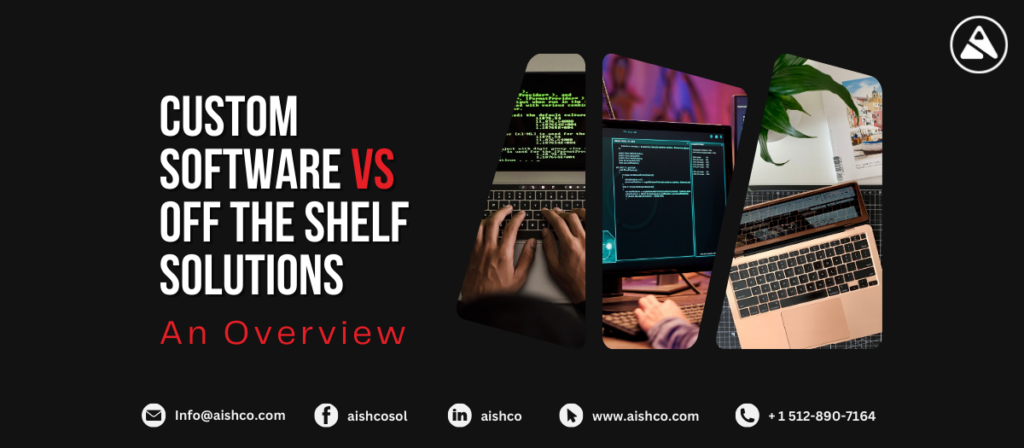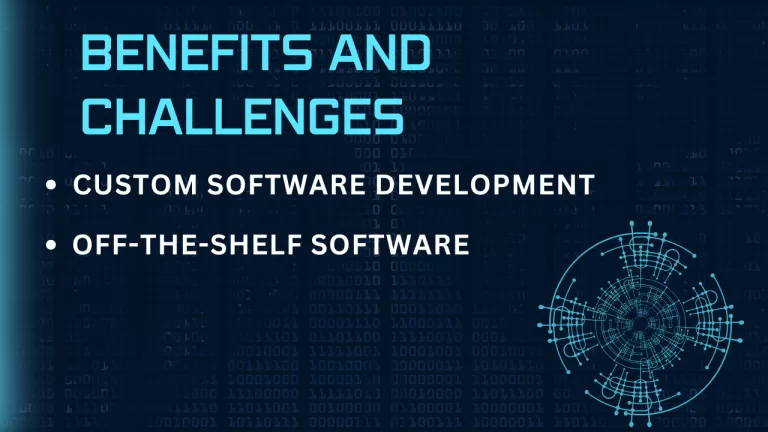
Custom Software vs. Off-the-Shelf Solutions: An Overview
Share post on
Table of Contents
Businesses often face the decision of choosing between custom software development and off-the-shelf solutions. Understanding the benefits and challenges of each option can help make the best choice for your startup or enterprise.
This guide delves into the key differences, advantages, and limitations of custom and off-the-shelf software to help you make an informed decision for your business. Whether you are a growing company with unique requirements or a business seeking cost-effective, quick solutions, the insights shared here will provide clarity and direction in your software selection journey.
Understanding the Basics
What is Custom Software Development?
Custom software development involves creating applications designed specifically to meet the unique requirements of a business. This type of software is developed from scratch, ensuring that all the features and functionalities align with the company’s needs and goals. Learn more about custom software development. Learn more about custom software development.
What is Off-the-Shelf Software?
Benefits and Challenges

Benefits of Custom Software Development
- Cost: Developing custom software can be more expensive compared to off-the-shelf solutions, as it requires significant investment in time and resources.
- Time-Consuming: The development process for custom software is often longer, as it involves detailed planning, design, and testing phases.
- Maintenance: Ongoing maintenance and updates are necessary to ensure the software remains functional and secure.
Challenges with Custom Software Development
While custom software offers many benefits, it also comes with its own set of challenges:
- Cost-Effective: These solutions are generally cheaper than custom software, as they are mass-produced and distributed to a wide audience.
- Quick Deployment: Off-the-shelf software can be quickly implemented, allowing businesses to start using the application almost immediately.
- Support and Updates: These solutions often come with regular updates and support from the vendor, ensuring the software remains up-to-date and functional.
Benefits of Off-the-Shelf Software
Off-the-shelf solutions are attractive for many businesses due to their affordability and ease of implementation. Some key advantages include:
- Cost-Effective: These solutions are generally cheaper than custom software, as they are mass-produced and distributed to a wide audience.
- Quick Deployment: Off-the-shelf software can be quickly implemented, allowing businesses to start using the application almost immediately.
- Support and Updates: These solutions often come with regular updates and support from the vendor, ensuring the software remains up-to-date and functional.
Challenges with Off-the-Shelf Software
Off-the-shelf software also comes with its set of challenges:
- Limited Customization: These solutions may not meet all your specific business needs as they come with standard features.
- Integration Issues: Off-the-shelf software might require additional integration efforts to work seamlessly with your existing systems.
- Scalability Constraints: There may be limitations on how much the software can scale to accommodate growing business requirements.
Industries and Use Cases
Industries Best Suited for Custom Software
Custom software is particularly beneficial for industries with complex and unique requirements. Some examples include:
- Healthcare: Custom software can address specific needs such as patient management, electronic health records, and telemedicine.
- Finance: Financial institutions often require bespoke solutions for risk management, trading platforms, and customer relationship management.
- Manufacturing: Custom applications can streamline production processes, inventory management, and supply chain operations.
Industries Best Suited for Off-the-Shelf Software
Off-the-shelf solutions are ideal for industries with standard requirements and limited customization needs. Examples include:
- Retail: Pre-built point-of-sale systems and inventory management software cater to the common needs of retail businesses.
- Education: Learning management systems and virtual classroom software provide ready-to-use solutions for educational institutions.
- Hospitality: Property management systems and booking software serve the typical needs of hotels and resorts.
Examples of Custom Software Solutions
- CRM Systems: Custom customer relationship management software designed to fit specific sales processes and customer interactions.
- ERP Systems: Enterprise resource planning software created to integrate and manage core business processes unique to a company.
- Mobile Apps: Custom mobile applications that offer personalized user experiences and functionality.
Decision-Making Factors
Factors Affecting the Cost of Custom Software
Several factors influence the cost of developing custom software, including:
- Complexity: The more complex the software, the higher the development cost.
- Features: The number and type of features required can significantly impact the overall cost.
- Technology Stack: The choice of technology and development tools can also affect the cost.
- Development Time: Longer development timelines typically lead to higher costs.
Factors Affecting the Cost of Off-the-Shelf Software
While generally cheaper, off-the-shelf software costs can also vary based on several factors:
- Subscription Fees: Many off-the-shelf solutions require monthly or annual subscription fees.
- Add-Ons and Plug-ins: Additional features or plug-ins might come at an extra cost.
- Integration Costs: There might be expenses involved in integrating the software with your existing systems.
- Training: Costs for training your team to use the new software.
When Should You Consider Custom Software Development?
- Your business has unique requirements that off-the-shelf solutions cannot meet.
- You need a scalable solution that can grow with your business.
- Integration with existing systems is crucial for your operations.
- You require high levels of security and data protection.
When Should You Consider Off-the-Shelf Software?
Consider off-the-shelf software when:
- You need a cost-effective solution quickly.
- Your business requirements are standard and do not need extensive customization.
- You prefer regular updates and support from the software vendor.
- Your project is short-term or temporary.
Making the Right Choice: Custom vs. Off-the-Shelf Software
Choosing between custom and off-the-shelf software depends on several factors, including your budget, timeline, and specific business needs. Evaluate the pros and cons of each option to determine which solution aligns best with your goals.
Custom Software vs. Off-the-Shelf: Key Differences
| Feature | Custom Software | Off-the-shelf Software |
|---|---|---|
| Customization | Designed to meet specific business needs | Standard features suitable for a broad range |
| Cost | Generally more expensive due to personalized development | Generally cheaper due to mass production |
| Deployment Time | Takes longer to develop and implement | Can be quickly implemented and ready for use | Scalability | Easily scalable to accommodate growing business needs | Limited scalability based on predefined features |
| Integration | Seamlessly integrates with existing systems | May require additional integration efforts |
| Maintenance | Requires ongoing maintenance and updates | Regular updates provided by the vendor |
| Support | Support designed to fit your specific software needs | Standard support services offered by the vendor |
| Security | High levels of security designed to business requirements | Standard security features |
| Upgrades | Customizable upgrades as per business growth | Fixed upgrade schedule defined by the vendor |
The Case For Custom Web Apps
Custom web applications offer businesses the flexibility to create unique online experiences that can differentiate them from competitors. These apps can be designed to meet specific user needs, enhance engagement, and provide a seamless user experience.
The Case For For Off-The-Shelf Web Apps
Off-the-shelf web applications offer quick deployment and cost-effective solutions for businesses with standard requirements. These apps can provide reliable functionality and regular updates, making them suitable for businesses looking for a hassle-free solution.
What Choice Will You Make for Your Business?
Ultimately, the decision between custom and off-the-shelf software comes down to your business’s specific needs and goals. Consider factors such as budget, timeline, scalability, and integration requirements when making your choice.
How We Can Help
We also offer guidance and support in selecting and implementing the right off-the-shelf software for your business. Our experts can help you integrate these solutions seamlessly with your existing systems, ensuring you get the most out of your investment.
Frequently Asked Questions
Q1: What are the main differences between custom and off-the-shelf software?
Custom software is designed to meet specific business needs, offering features and functionalities aligned with your requirements. Off-the-shelf software provides standard solutions that are readily available for immediate use.
Q2: How long does it take to develop custom software?
Q3: Is custom software more expensive than off-the-shelf solutions?
Custom software is generally more expensive due to the personalized development process and the need for ongoing maintenance and updates.
Q4: Can custom software be integrated with existing systems?
Our Services
Our company specializes in custom web applications, providing solutions using the latest technologies. It develops innovative mobile apps for both iOS and Android platforms to engage users effectively. Expert business consulting services are available to enhance operations through modern technologies.In e-commerce, the company builds platforms to improve customer experience and boost online sales. Additionally, staff augmentation services offer skilled developers to support projects. Our digital marketing strategies focus on enhancing online presence and reaching target audiences across various applications.
Share post on
